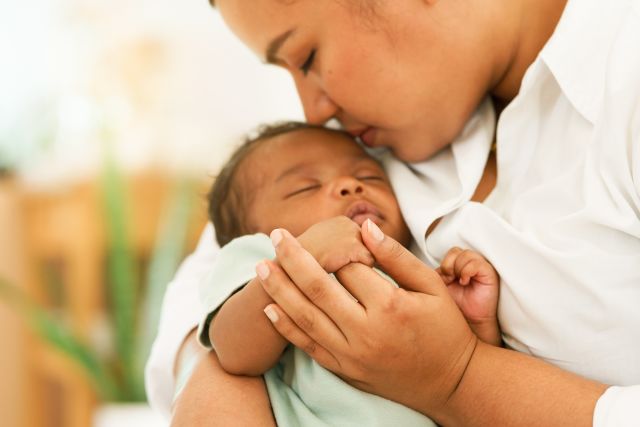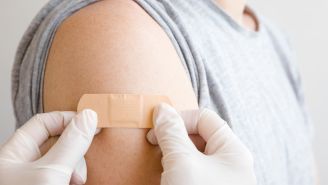Updated on September 9, 2024.
Every year in the U.S., tens of thousands of people are hospitalized and up to 10,000 people die from respiratory syncytial virus (RSV) and related complications. But new RSV immunizations could help protect those at highest risk from severe infections.
Experts estimate that the RSV vaccine could prevent up to 25 percent of hospitalizations among older adults. And up to 76 percent of infant hospitalizations could be avoided if most of those eligible were immunized against RSV, the Centers for Disease Control and Prevention (CDC) reports.
Who should get it—and when?
For most otherwise healthy older kids and younger adults, RSV may seem like a common cold. But for others, the virus can trigger serious complications, including bronchiolitis (inflammation of the lung’s small airways), pneumonia and respiratory failure.
Among those at risk for severe RSV:
- Children younger than 2
- Adults older than 65
- People with lung or heart disease or a weakened immune system
Until recently, there was no way to prevent RSV other than trying to avoid exposure to the virus. But for the first time in 2023, the CDC recommended new immunizations, which offer protect against the disease.
Arexvy: This is the world’s first RSV vaccine. It is a protein subunit vaccine made by GSK. A protein subunit vaccine contains protein fragments—not live, weakened forms of the virus. It is approved for:
- Adults ages 60 and older
Abrysvo: This vaccine is similar to Arexvy, but developed by Pfizer. It is approved for:
- Adults ages 60 years and older
- Pregnant people between 32 and 36 weeks of pregnancy (to protect newborns during the first six months of life)
mRESVIA: This is an mRNA vaccine made by Moderna. This type of vaccine works by using mRNA to deliver a piece of genetic material that carries instructions for making the protein that a virus uses to infect cells. This triggers an immune response in the body. It is approved for:
- Adults ages 60 years and older
One RSV vaccine dose is currently recommended for:
- All adults ages 75 and older
- Adults ages 60 to 74 who are at increased risk of severe RSV
- People who are 32 to 36 weeks pregnant (to prevent severe RSV in newborns)
Nirsevimab (Beyfortus) and Palivizumab (Synagis): These are not vaccines. They are monoclonal antibodies. Monoclonal antibodies are lab-made proteins that mimic the antibodies made by the body naturally. Some babies may not need this shot if their mother received the RSV vaccine at least 2 weeks before they were born. If not, one dose is given at the following ages:
- Babies born between October and March should get 1 dose by the time they are 1 week old.
- Babies born between April and September should get 1 dose before the start of their first RSV season (usually October).
- Some babies who are at high risk for serious illness from RSV may need another dose at the start of their second RSV season.
Each of these drugs help protect against RSV by targeting a protein called RSV F glycoprotein that lives on the surface of the virus and enables it to invade cells. By binding to this protein, the drugs prevent the virus from infecting cells.
The RSV vaccine isn’t a seasonal shot
The flu and RSV tend to spread in the fall and winter months. The best time to be immunized against RSV is late summer or early fall. But unlike the flu vaccine, the RSV vaccine is not an annual shot.
People do not need to get an additional dose every RSV season. For adults ages 60 and older, Arexvy and Abrysvo offer protection for up to two years. Those who get mRESVIA should have at least 50 percent protection for up to 1.5 years.
Nirsevimab has been shown to protect children against severe RSV disease for at least five months.
Talk to your healthcare provider (HCP) about what vaccine schedule is best for you.
Are the RSV vaccines safe?
Anyone who has had a severe allergic reaction to any ingredient of an RSV vaccine should not get it. Side effects from the vaccine are usually mild and go away on their own. They may include:
- Pain, redness, and swelling at the injection site
- Fatigue
- Fever
- Headache
- Nausea
- Diarrhea
- Muscle or joint pain
In clinical trials, 10 people who received GSK’s Arexvy within 30 days developed a type of irregular heart rhythm called atrial fibrillation, compared to only four people who received the placebo.
In a smaller study, in which some participants received Arexvy along with a flu shot, two people developed acute disseminated encephalomyelitis (ADEM), a rare type of inflammation that affects the brain and spinal cord soon after vaccination. One of the participants who developed ADEM died.
In another small study, one participant developed Guillain-Barré syndrome (a rare disorder that leads to muscle weakness and sometimes paralysis) nine days after receiving Arexvy. The FDA has required GSK to further investigate the risks for Guillain-Barré syndrome and ADEM. GSK is also continuing to assess the possible risk for atrial fibrillation.







